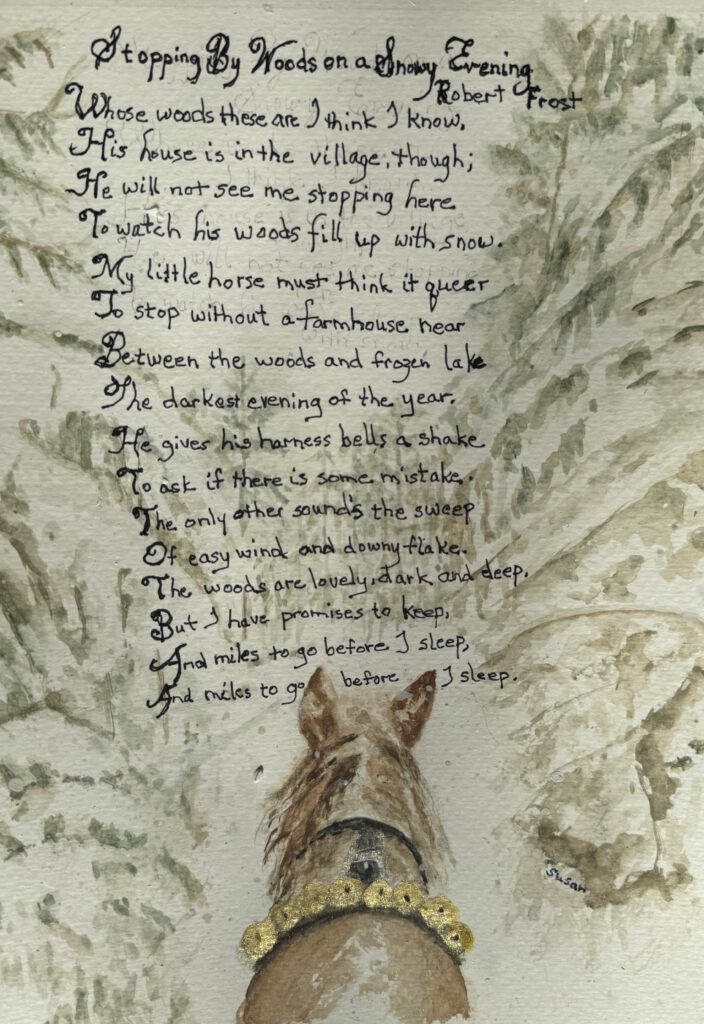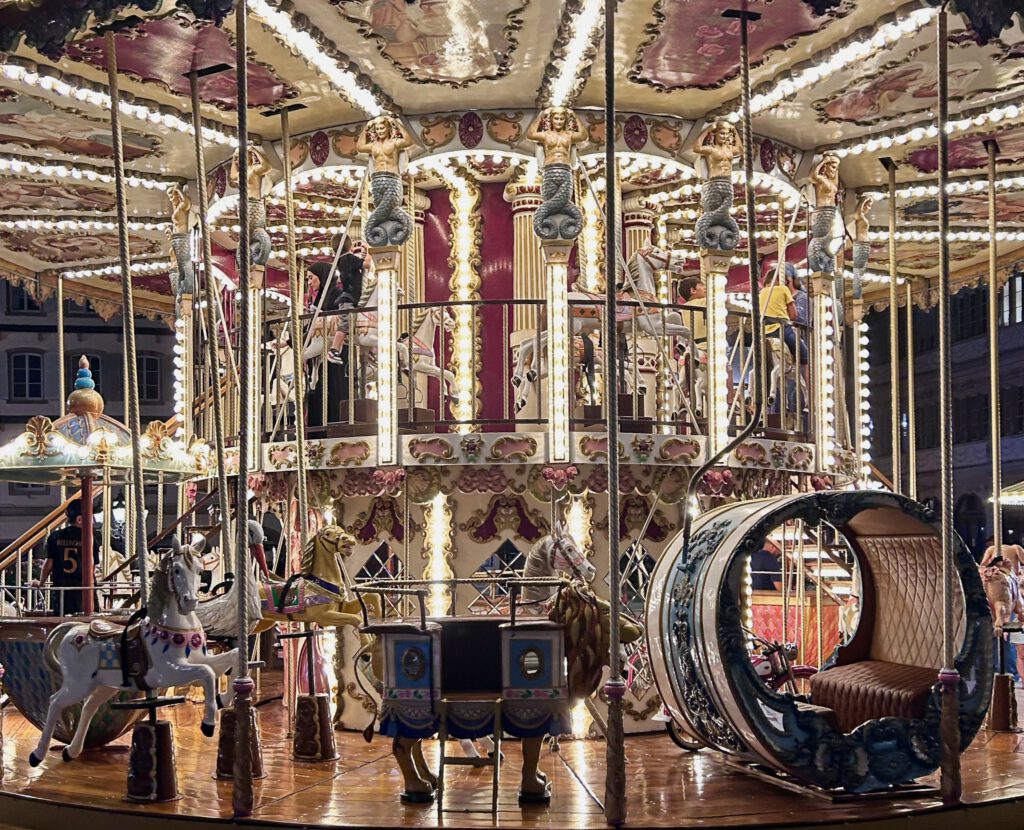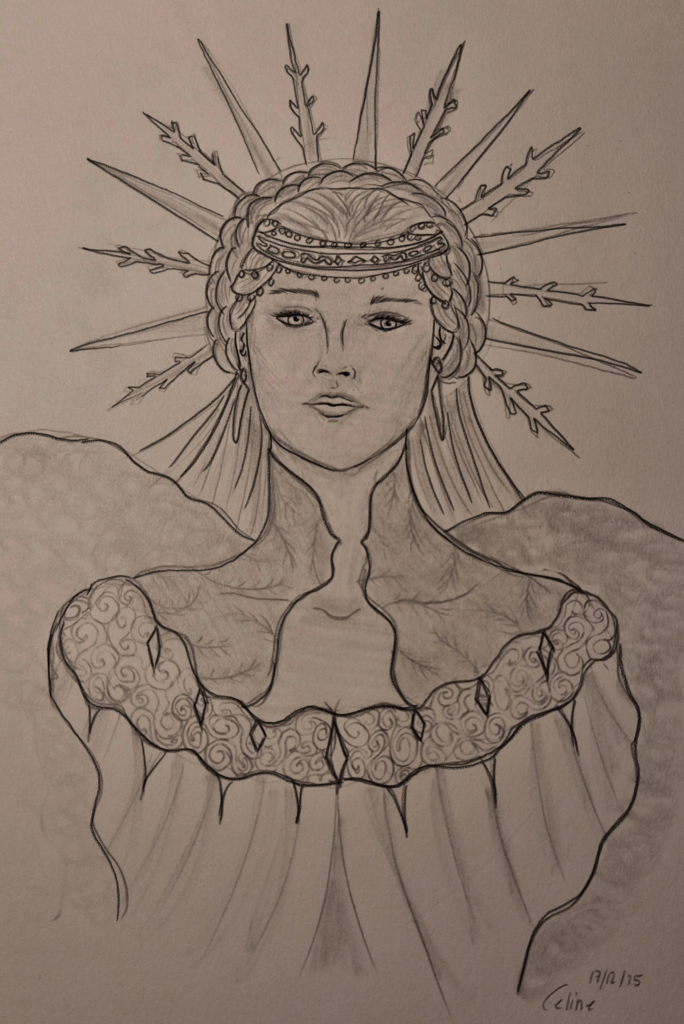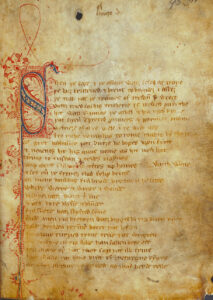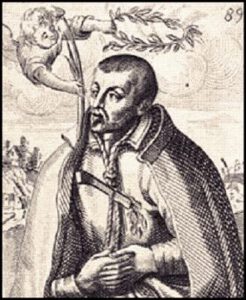Shakespeare De-witched: A Response to Stephen Greenblatt
Inge Leimberg
Published in Connotations Vol. 11.1 (2001/02)
The following response was written some three years ago and sent, successively, to the editors of some of the most likely journals who were, however, "unable to accept it for publication; [because] it is not really an article, but rather a response" and therefore "not suitable" for that journal, or because (though "largely convincing, […] very interesting" and "learned") it is "vulnerable to the claim that the author's approach is simply an old−fashion [sic] reaffirmation of old pieties about the Elizabethan world picture against trendy critics." In another case the editors' affirmation that they looked "forward to being in touch with [me] soon" was the last I heard of them in two years.
Since, rereading my paper, I still think the main points if not "largely convincing" at least worthy of discussion, I now publish it in a condensed form (needless to say, with my co−editors' consent) in Connotations for my readers to see for themselves and, hopefully, to enter into critical debate.
* * *
The focus of Greenblatt's article "Shakespeare Bewitched,"1) as I see it in this response, is the dramatist's unique contribution to the problem of witchcraft and witch prosecution, so much disputed in Shakespeare's age. According to Greenblatt the leading role the witches play in Macbeth makes the historical and the histrionic coalesce and the critic gets a chance to elucidate the dramatists's techniques and [→page 61] purposes by seeing the play in the light of the non−fictional literature on the subject.
Greenblatt is not concerned with historical documents in the strict sense but with treatises devoted to magic lore for political and theological purposes. Apart from some older ones as well as King James' Daemonology,2) the text he mostly refers to in this study of Macbeth is Reginald Scot's Discoverie of Witchcraft. What matters is, as it seems to me, that Scot and Shakespeare are not primarily regarded as real or possible partisans of reaction or progress but as writers concerned with the problem of using words in order to transform into a "speaking picture"3) what otherwise would have remained an abstract argument.
While, as Greenblatt shows, this is to Scot what poets do but should not, it is to Shakespeare the very office of the poet4) (especially the dramatist) who is situated beyond the good⁄bad divide of moral treatises, however welcome when of such humane fibre as Scot's Discoverie. In a play including witches the audience are not to expect moral or social directions on witches being evil or harmless and, therefore, to be prosecuted or not. The poet wants to teach and delight5) his audience, i.e. to make them aware of matters social, moral, political etc., not to lay down the law for them. Quite unlike Reginald Scot, that pleasant moralist, the dramatic poet, Shakespeare, wants us, quite literally, to see and hear for ourselves, and when he puts witches on the stage he uses a device most congenial to dramatic expression.
This is how I see Greenblatt's position, and I find it convincing in many respects. To me, too, it is a matter of course for the critic to be on the lookout for facts and texts belonging to the practical as well as intellectual life of a poet's era which may help us understand his work as well as his era (seen in a complex, not a "monolithic" way) perhaps just a little better; I welcome Greenblatt's reading of Scot which focuses (e negativo) on the very elements of literary production; and I am positively grateful for his convincing demonstration of the literary text being different in kind from what in German is called Gebrauchsprosa (functional prose). But though I largely agree with him in principle, I [→page 62] am afraid that I cannot always see eye to eye with him in practice. Therefore I should like to discuss the following points.
1. Literal and Figurative Meaning
Greenblatt employs the metaphor "bleeding" to characterize the "mutual contamination of the secular and demonic" in Macbeth6) and borrows from Puttenham the term "Translacer"7) to point out the transformation of the comparatively harmless witchcraft that is Scot's concern into the "phantasmagorical horror" (125) of this play. An outstanding example of such a poetic transformation of meaning while preserving the "initial verbal elements" (125) is Lady Macbeth's pronouncement: "Hie thee hither, ⁄ That I may pour my spirits in thine ear […]"(1.5.25−6).8) "The 'spirits,'" says Greenblatt, "she speaks of here are manifestly figurative […]" (124). But are they? Certainly the vision of murder done by poison poured into someone's ear did not strike Hamlet's father as "figurative,"9) nor did it Claudius. The closeness of the parallel between the murder of Gonzago and Lady Macbeth's doings is, moreover, borne out by Lucianus's words: "With Hecate's ban thrice blasted, thrice infected, ⁄ Thy natural magic and dire property ⁄ On wholesome life usurps immediately."10) This pattern of poisoning through the ear which may have been suggested to Shakespeare by Pliny or by reports of the murder of the Duke of Urbino in 1538,11) haunted him in such a measure that he employed it as an outstanding topos in three of the great tragedies, for Iago also murders in that way: "I'll pour that pestilence into his ear."12) Instead of "pestilence" Lady Macbeth says "my spirits," and this leads me to Greenblatt's interpretation:
The "spirits" she speaks of here are manifestly figurative—they refer to the bold words, the undaunted mettle, and the sexual taunts with which she intends to incite Macbeth to murder Duncan—but, like all of her expressions of will and passion, they strain toward bodily realization, even as they convey a psychic and hence invisible inwardness. That is, there is something uncannily literal about Lady Macbeth's influence on her husband, as if she [→page 63] had contrived to inhabit his mind—as if, in other words, she had literally poured her spirits in his ear. Conversely, there is something uncannily figurative about the "sightless substance" she invokes, as if the spirit world, the realm of "Fate and metaphysical aid," were only a metaphor for her blind and murderous desires, as if the Weird Sisters were condensations of her own breath. (124−25)
The reference (in note 38, 133−34) to a passage from Hobbes' Leviathan concerning "[…] the connection between the literal and figurative uses of the term spirit: both rest on the breath," implies the interpretation of "spirits" in the sense of the vapours and fluids permeating and animating the body (OED); otherwise this quotation is rather non−commital. I would suggest rather to consult contemporary works providing more detailed information. Robert Burton, for instance, writes in his Anatomy of Melancholy:
Spirit is a most subtle vapour, which is expressed from the blood, and the instrument of the soul, to perform all his actions; a common tie or medium between the body and soul.13)
Helkiah Crooke, in a meticulous scholarly description of the organs and substances involved in the process of hearing, provides a further link for the understanding of Shakespeare's text:
[…] the receiued opinion is, that in this cauity [of the ear, where the larger branches of the nerve of hearing form a membrane] the sense of hearing is especially administred, because into it the Animall spirit entreth through the nerve, & is there mixed with the inbred ayre […].
The vse of this nerue is (according to Galen […]) to be the Organ of hearing, and to receiue the sensible obiect that commeth from without, and to leade the images of the sounds vnto the braine as vnto their competent Iudge and Censor […].14)
Needless to say, nothing happens in the brain without the animal spirit as a conveyor or, in Kepler's words, the effect of hearing on the mind and the will is reached only
cùm species Membri sensioni destinati, ut id est affectum ab externa re, venit introrsum ad sensus communis tribunal, commeatu spirituum.15)
[→page 64] If we take the poet at his word there can be no doubt that the words "That I may pour my spirits in thine ear" have a literal meaning. This holds good, too, when the "spirits" are taken to be the meaning conveyed by the words into the psychosomatic line, which reaches from the spirit (or breath) poured into the ear, via the mingling of the speaker's and hearer's spirits when the air of the breath comes to be mingled with the "inbred ayre," up to that "tribunal" where reason speaks and the will receives and issues its commands.16) In Macbeth's case this is a doubly "infected will"47) because it is influenced by the "contageous breath"17) of a woman about to commit herself to the Devil. The spirits Lady Macbeth intends to pour into her husband's ear are not "manifestly figurative" but unmistakably literal and there is nothing of the "as if" about her pouring them. She does so.
When Greenblatt goes on: "Conversely, there is something figurative about the 'sightless substances' she invokes, as if […]," the very context speaks, to me, against rather than for this interpretation because, in the text, the expression "sightless substances" does not denote the abstract complement of a sensual image but the proper name of a real, though not mundane, entity. The actual words are: "Come […] ⁄ […] you murth'ring ministers, ⁄ Wherever in your sightless substances ⁄ You wait on Nature's mischief" (1.5.48−50). The relation between the "murth'ring ministers" and the "sightless substances" is not an aesthetic one of image to meaning (whether figurative or literal) but an ontological one of accidence to substance, or of the merely phenomenal to the metaphysical, or of appearance to reality. Far from being "objective, substantial beings" in an only concessional manner, "though invisible,"18) these "ministers" derive their final reality from the very invisibility that is the hallmark of their substance.
One need not be a believer in hard−and−fast, one−sided world pictures to assume that in Shakespeare's work (and age) the chain of being, reaching from the apparently lowest region of nature to the very highest spiritual reality, was not yet irreparably broken—though, historically, very near that break. Thomas Mann says, an era seems the remoter for its having occurred immediately before a decisive [→page 65] historical change.19) Shakespeare's was just such an era. What was declared to be mythical by rationalist scientists from Descartes onwards but has meanwhile been rediscovered and scientifically rehabilitated by psychosomatic research, was still unquestioned by many Elizabethans, to whom body and soul, thanks to the sublimation of the spirits from vegetative to sensitive to vital to animal, formed an indivisible unity; the spoken word was the spirit in a theological as well as in a physiological sense, being not only a conveyor of spirit but conveyed by the spirits permeating the microcosm of man.
And that is where Greenblatt's expression "only a metaphor" comes in. Metaphoric expression is as vast a field as the unity of body and soul; it has been controversial from, at least, Cicero onwards and there always have been schools of thought who would have agreed to an "only" going with metaphor. But, as far as I can see, Shakespeare did not belong to them, and the statement that there is "something uncannily figurative about the 'sightless substances' [Lady Macbeth] invokes, as if the spirit world […] were only a metaphor […]" (124), to my mind, does not meet the case. Dividing the literal from the figurative meaning like this, as well as reducing both to a merely conditional status, seems like reading them with the eye of a classicist who firmly takes sides in the old scholastic struggle concerning "ambiguity," drawing a firm line between image and meaning and demanding not a disturbingly interesting (or even missing) tertium comparationis, but an obvious one, sanctioned by nature and the ancients.20) But in the passages under discussion image and meaning in metaphor seem to me as closely and mysteriously related as mind and matter or body and soul.
From the angle of literary theory these problems are discussed in detail by Puttenham but, though focusing on the term "Translacer," Greenblatt does not refer to the chapters of the Arte of English Poesie concerned with the impact of words on the ear and, accordingly, on the mind.21) Nor does he consult Sidney's Apology for Poetry (published 1595) when he discusses "energeia, the liveliness that comes when metaphors are set in action" (121).22) Why, in a study aiming at immediate [→page 66] historical relations, leave energeia (or enargeia) to Aristotle and Quintilian alone and disregard Sidney whose contributions to this subject are innovative rather than traditional? Nearing his peroratio Sidney regards "energia," not in the sense of rhetorical instrumentality but of the poet's profound emotion, as the sine qua non of persuasion which poets can only achieve when
in truth they feel those passions, which easily (as I think) may be betrayed by that same forcibleness or energia (as the Greeks call it) of the writer.23)
Sidney's pleading for "energia" as a means of moving to fear and pity and replacing the Horatian alternative of "aut prodesse […] aut delectare" by the triad delight—teach—move (which he saw as a climax) is perhaps one of the most effective steps of Elizabethan literary theory towards the impact of Shakespeare's metaphoric language.24)
2. Locating Theatre and the Demonic
According to Greenblatt, Reginald Scot's "concern is with the boundary between the imaginary and the real" (114), his project being "disenchantment in the interest of restoring proper religious faith" (115); by contrast "Macbeth manifests a deep, intuitive recognition that the theater and witchcraft are both constructed on the boundary between fantasy and reality […]" (123).
To prevent a misunderstanding: my quoting Greenblatt's term "witchcraft" does not mean that I adopt it. As I hope to show, the Weird Sisters in Macbeth have very little in common with witches in the sense of the prosecutors, and their doings are something very different from what writers concerned with "witchcraft" like Scot mean when they use the term. I agree, however, with Greenblatt that the components represented for him by "witchcraft," i.e. "fantasy […], imagination […], figure […], psychic disturbance" (123) are indeed essential for Shakespeare's (or any other) theatre. But then, again, I find myself disagreeing with the binary and, therefore, somehow two−dimensional [→page 67] structure of the concept ("fantasy and reality, […] figure and actuality, psychic disturbance and objective truth […]," 123).
Why, for instance, is the component "religious faith" left out on Shakespeare's side of the comparison with Scot? Though it was not Shakespeare's aim to "restore" religious faith in the men and women who constitute a Christian commonwealth, surely it was a major concern with him to make them aware of it. In Macbeth the English scene alone shows clearly enough that all the manifestations of fate so characteristic of this play have to be regarded against the background of faith. The words "take a bond of fate"(4.1.83−84) lose their edge when religious faith is left out of consideration. The word "bond," partly sharing its meaning with covenant, had (in 1606) a strong political denotation, but the theological one was, if anything, even stronger.25) And what a Shakespearean word it was in all its semantic shades from the bonds of marriage to the bonds which are fetters. Moreover the "bond of fate" in Macbeth is foreshadowed by the "bond of faith" in Richard II where, for all the monarchical connotations of "bond of faith," the religious ones are overtly present in that very scene (4.1.76). Taking one's bond implies the exclusion of other allegiances: taking "a bond of fate" means discarding the bond of faith. Macbeth's words "I'll […] take a bond of fate" transport the hearer into a linguistic, intellectual and iconographic realm where fatum and fides, shaped into the near homonyms fate and faith in English, clash with the force of tragic inevitability.
When it comes to finding the place where theatre and the demonic are constructed the religious issues so palpably present in Macbeth seem most helpful to me. From Aeschylus onwards, the theatre has had a firm grounding in Homeric theology; and the theatre of the Christian middle ages which survived into Shakespeare's life−time was essentially religious and not so much situated "between fantasy and reality" as on the "place" where "the Castle of Perseueraunse […] stondyth […] In the myddys" between "Deus," "Mundus," and "Belyal." 26)
[→page 68]This "place" is not a nameless in−between where fantasy and reality meet. It has, in different facets, an existential value all its own which it sometimes shared, nearly up to Shakespeare's days, with the places of religious worship.27) It did not survive only in some decadent mystery plays until the final ban pronounced in 157928) but, in the very beginnings of the great Elizabethan drama, in what is perhaps its most striking example outside Shakespeare, Marlowe's Doctor Faustus. There that tragic clash of "faith" and "fate" was first enacted on a stage representing the very old and very modern and enduring place where everyman, flanked by the good and bad angel, has to face his hell−within.
In a Shakespearean context "fate" is as closely bound up with "faith" as with the history of the theatre. This is mentioned by Greenblatt when, having quoted Scot's confession that he had never seen any devils conjured up by witches "except it were in a plaie," he writes:
I do not know what plays Scot who published the Discoverie in 1584 had in mind. (He had been a student in Oxford and may have seen or acted in plays there.) The great English Renaissance drama—including, of course, Doctor Faustus and Macbeth—lies ahead. What, if anything, does it mean for this drama to come after Scot? (117)
To me it means something only in connection with the dramatic tradition brought to bear in the sixteenth century, with its unthought−of flood of editions and translations, retaining certain vestiges of the old catholic culture while humanist learning and protestant thinking took over, continuing and changing, and promoting or condemning the theatre which, however, withstood the various onslaughts and, as has been documented by E. K. Chambers, eventually became a political factor to count with.29) Plautus and Terence being part of the grammar−school curriculum,30) an educated man like Scot just could not help having been made acquainted with plays. That, for reasons of personal taste as well as doctrinal convictions, he does not seem to have liked them, is another matter that does not diminish the immediate [→page 69] impact of a manifold dramatic tradition where the demonic, in different facets, had always played its part, and a star part at that.
Nobody would deny that Shakespeare had an intuition all his own. But when it comes to the creation of dramatic unity and purpose out of "theater and witchcraft" (meaning the kind of "witchcraft" represented by the Weird Sisters) he was certainly not confined to his "intuitive recognition." The combination of theatre and the demonic is so deeply traditional that it is felt to be natural, and the examples, for Shakespeare, were legion.
To realize the wideness of this field it is useful to consult Holinshed: "[…] afterwards the common opinion was that these women were either the weird sisters, that is (as ye would say) the goddesses of destinie, or else some nymphs or feiries, indued with knowledge of prophesie by their necromanticall science, […]."31) Since I propose to add the furies to Holinshed's list, I had perhaps better quote a reliable source for their affinity to "the goddesses of destinie," alias the fates, and here it is:
Pyr. Thy mantle good,What! Stain'd with blood?
Approach, ye Furies fell
O Fates, come, come!
Cut thread and thrum:
Quail, crush, conclude, and quell.32)
But, joking apart, in King Lear the tragic conflict echoes the fates and faiths of Oedipus and Antigone and Hamlet is Shakespeare's Orestes. In Hamlet the furies are not put into the costumes of anything resembling the Weird Sisters but they are present none the less, if not more alarmingly so. Moreover, many of the ghosts and spirits which haunt the Elizabethan stage come, needless to say, from Seneca His Tenne Tragedies. Opening the first of them, Hercules Furens, we see before our mind's eye "The Syster of the Thunderer," Juno, who, possessed with the desire of revenge on Hercules, realizes that there is only one way: [→page 70]
Seekes thou a match t'Alcides yet?
Thers none, except hymselfe: let him agaynst himselfe rebell.
Let present be from bottome deepe upraysd of lowest hell
Th'Eumenides […]
Let hateful hurt now come in anger wood,
And fierce impiety imbrewe himselfe with his own bloud,
And errour eke, and fury arm'd agaynst it selfe to fight.
This meane, this meane, let wrath of myne now use to showe my might.
That mad of minde and wittes may Alcides driven bee
With fury great through pearced quight, my selfe must first of all
Be mad. Wherefore doth Juno yet not into raging fall?
Mee, me, ye Furyes, systers three throwne quite out of my wit
Tosse fyrst […]. 33)
If this is supposed to be merely a kind of drama more recited than acted, or more to be heard than seen, so was (compared with cinematic naturalism) Shakespeare's, as he expressly tells us, for instance, in the final captatio benevolentiae of the first Prologue in Henry V; and if Newton's Seneca is supposed to be an outdated classical source, that just does not meet the facts. In the translation (1581) Seneca was felt to be very much up to date and had enormous influence. Surely the amalgamation of the demonic and the theatrical, or of reality and fantasy, or of the mundane and the transcendental in Juno's prologue helps to locate the "boundary" where Shakespeare's theatre and the demonic are "both constructed," and I should perhaps prefer to ask what it means for "The great English Renaissance drama to come" after Newton's Seneca than "after Scot."
3. The Witches and the Weirds
Greenblatt's argument proceeds from Donalbain's whispered advice to Malcolm that flight is inevitable:
What should be spoken here,
Where our fate, hid in an augur hole,
May rush and seize us? (2.3.117−19)
[→page 71] The augur hole has ceased to be an actual passageway, uncannily small and hence virtually invisible, for witches to pass through and has become a figure for the fear that lurks everywhere in Macbeth's castle. And the Weird Sisters, of whose existence Malcolm and Donalbain are entirely unaware, have been translated into the abstraction to which their name is etymologically linked—fate. (125)
I am sorry to disagree with most of this statement. To me, the link between the Weird Sisters and fate is not an etymological but a semantic one; fate, as nearly always in Shakespeare, is not used here as an "abstraction" (abstractions who "hide" in order to "rush and seize" their victims cease to be abstractions through the force of metaphoric energia), the Weird Sisters are neither here nor anywhere "translated into [an] abstraction," and the "augur−hole," in the context of this play, is not fully appreciated as a mere opening made by a drill. The "augur−hole" does indeed echo the one in Scot's Discoverie and wants to be visualized as a hole made by a (n)auger,34) but the augur, too, is suggested who takes the measurement of the templum in order to disclose the hiding place of fate.35)
"Fate" and "augur−hole" are used energetically in the three lines, the potential abstract, "fate" striking with the force of a mythological name by being verbally enlivened and making the audience witness, with their minds' eyes, a vision of horror. "Fate," in the context of Donalbain's words as well as in the context of the play (with much corroboration in the Shakespeare−canon)36) quite openly denotes not an abstraction but a demonic power related to the Weird Sisters in a semantic as well as in a seminal way. "The Weird Sisters" is another name for "The Fates" or "The Destinies" with "The Nornes" or "The Moiras" lurking in the background of northern or classical mythology.
In Holinshed, as mentioned above, Banquo and Macbeth first believe to have met with some "women in strange and wild apparell, resembling creatures of an elder world" and treat them and their promises as
[…] some vaine fantasticall illusion […]. But afterwards the common opinion was, that these women were either the weird sisters, that is (as ye would [→page 72] say) the goddesses of destinie, or else some nymphs or feiries, indued with knowledge of prophesie by their necromanticall science, bicause euerie thing came to passe as they had spoken.37)
Shakespeare took over the archaic "weird" (usual in OE, rare in ME but occasionally present in Chaucer, Langland, and Gower)38) from Holinshed to use it exclusively in Macbeth with hardly a verbal alternative. The word "witch" occurs only once in "Aroint thee, witch!" (1.3.6); apart from this there is "Witches' mummy" (4.1.48) and "Witchcraft" (2.1.51−52), and that is all about "witches" in Macbeth. For, surely, the dramatis personae weigh lightly compared with the evidence of the text recited on the stage. The name "Weird Women" (3.1.2) or "Weird Sisters" (1.3.32; 1.5.7−8; 2.1.20; 3.4.132; 4.1.136) may have been used to make the audience "attentive" (because of its archaic tone), "benevolent" (because of fate being such a common enemy), and "docile" (because of the historical verisimilitude provided by Holinshed).
Of course the Weird Sisters are nothing if not equivocal. Shakespeare makes them enact various kinds of witchery (as, for instance, in the sailor's wife−episode). Moreover, they are dramatically reborn into an era of transition, when Death, Fortune and Love have ceased to figure as mythological powers in dramatic inductions40 and appear in their no less formidable substrata in the human soul as represented by the dramatis personae in the "historical" world of the main action. This holds the mirror up to men and women who are becoming aware of the (very old and very modern) "hell within"39) being rather more terrible than the one safely located in some nether world. Giordano Bruno's many−centred, endless universe, in which there was no place for an abyss of hell, was felt (for instance by Kepler)40) to be more hauntingly charged with mystery than the old three−storied cosmo−theological hierarchy surrounded by the primum mobile. Modern man, in Macbeth, has to face the existentially uprooting fact that "[…] security ⁄ Is mortals' chiefest enemy" (3.5.32). And that is how the Fates once more enter the main action. Surely the Weird Sisters are made to pose as witches and want to be considered in terms of witchcraft (and, [→page 73] perhaps, witch prosecution) as well as in terms of psychological projection but, compared with their demonic character, only marginally so. This pattern seems to me reversed in Greenblatt's statement:
[…] Shakespeare is staging the epistemological and ontological dilemmas that in the deeply contradictory ideological situation of his time haunted virtually all attempts to determine the status of witchcraft beliefs and practices. (123)
The "status of witchcraft beliefs and practices" is not Shakespeare's object in Macbeth; he is concerned rather with "The Wirdes, that we clepen Destine, ⁄[…] ⁄ […] the fatal systren"41) than with the kind of witches Reginald Scot has in mind when he describes "Who they be that are called witches":
One sort of such as are said to be witches, are women which be commonly old, lame, bleare−eyed, pale, fowle, and full of wrinkles; poore, sullen, superstitious, and papists; or such as knowe no religion: in whose drowsie minds the divell hath goten a fine seat […].
Another sort of witches there are, which be absolutelie cooseners. These take upon them, either for glorie, fame or gaine, to do anie thing, which God or the divell can do: either for fortelling of things to come, bewraing of secrets, curing of maladies, or working of miracles […].42)
The one link between Scot's witches and the Weird Sisters is the witches' pretence to be able to prognosticate. This is, however, a theme not coming up with the medieval discussion of witches but is at least as old as Aristotle's Poetics. The fallacy to which Macbeth succumbs when he thinks that the Weird Sisters (who have appeared to him as what Holinshed calls "three women in strange and wild apparell") must know all the future because they know some of it, follows the same pattern as Aristotle's Homeric paradigm for "the proper way of telling lies."43) Aristotle mentions this in his discussion of the marvellous as a constituent of tragedy44) which, following the formalist kind of reasoning still valid in Shakespeare's time, is the appropriate category where the Weird Sisters are concerned.
[→page 74] By contrast with the Weird Sisters in Macbeth who happen to have foretold the future indeed, Scot's witches, for all the pretence of some of them to be able to tell the future, are women of flesh and blood who have succumbed, to what degree and in what way howsoever, to the Devil. If, in Macbeth, there is a witch in the sense of the prosecutors, it is Lady Macbeth who gives herself up to the Devil, in a scene of nightmarish obscenity, before the spectators' very eyes. Accordingly, in her case the question of punishment, which would be an absurdity with respect to the Fates, does come up in the play. Following the reasoning of King James in the Daemonology, her madness might be called a "Daemonique" sickness and, as such, be very real and comparable (characteristically) to the "Pest"45) and to be cured "Only by earnest prayer vnto God, by amendment of their liues, and by sharpe pursuing euery one, according to his calling of these instruments of Satan, whose punishment to the death will be a salutarie sacrifice for the patient."46) That is Lady Macbeth's case. "More needs she the divine than the physician" (5.1.71) says the "amaz'd" Doctor who finds himself unable to "minister to a mind diseas'd" (5.3.40). Very soon the final remedy is applied: "The Queen, my Lord, is dead" (5.5.16)—and still no prayer but instead of it Macbeth's nihilist vision.
The scenes concerned with Lady Macbeth's madness and death gain an added distinction in being preceded by as well as contrasted with the English scene. Here another Doctor testifies to the "sanctity" that "Heaven" has given to the King's hands, so that he can, indeed, cure people who are "The mere despair of surgery," combining, moreover, his "healing benediction" with a "heavenly gift of prophesy" (4.3.141−59). Lady Macbeth is shut out from this healing influence by having prostituted, in herself, womanhood and humanity, to the Devil. In Lady Macbeth's case Shakespeare does give us some hints as to his attitude toward capital punishment of "witches" as he also does, in this play, concerning the different spheres of human beings gone wrong, or demonic powers realized in archaic shapes and called by mythological names, or the terrors of hell within the human soul or, [→page 75] finally, of "Heaven" curing incurable diseases through the hands of a good king.
Westfälische Wilhelms−Universität
Münster
































 Ring out, wild bells, to the wild sky,
Ring out, wild bells, to the wild sky,







